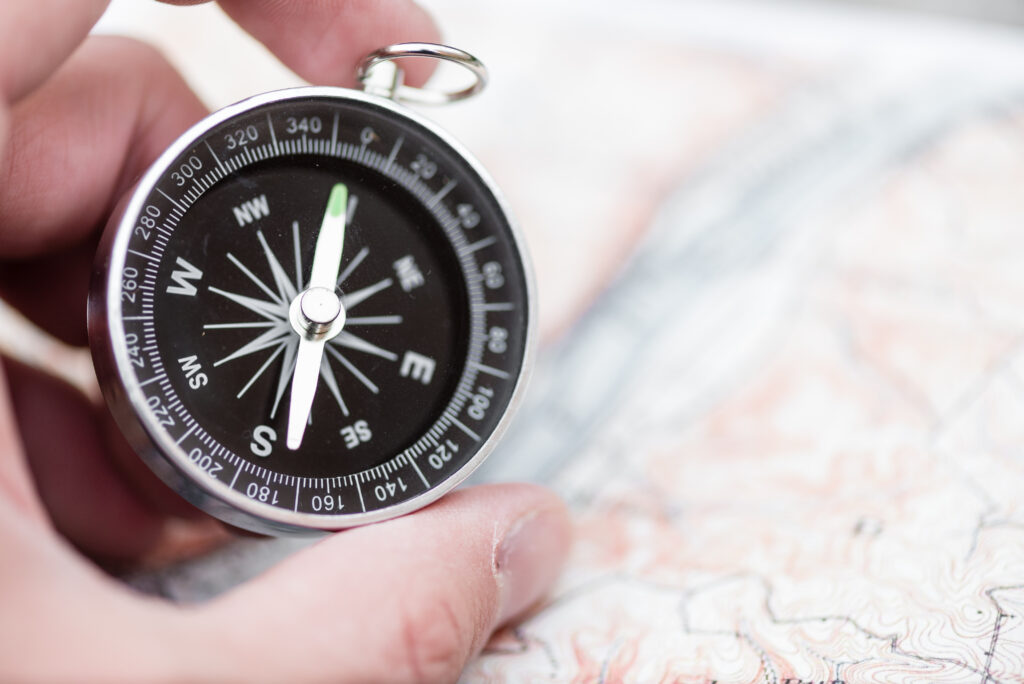
Dive into the journey that could redefine your entire existence – the path to sobriety, filled with purpose and the thrill of discovering who you really are. “Find Your True North” is more than just a guide; think of it as your personal compass. It’s here to help you sail through the rough seas of recovery, directing you to a life that’s not only fulfilling but is also built on the foundation of your core values and wrapped in the warmth of self-kindness. Let’s peel back the layers of this life-changing adventure and see how you can root your recovery in the values that echo true to your heart and soul.
Starting your journey toward sobriety, think of your values not just as markers on the road but as the road itself. They’re the foundation that your actions build on, the unseen forces that quietly steer your choices, and the standards that measure how enriching your journey to recovery becomes. When you pause to reflect on what your values truly are, it’s like turning on a light inside yourself, revealing the drives behind your actions and nudging you toward choices that reflect who you really are. But here’s the thing: this adventure you’re embarking on? It’s not a quest for perfection. It’s a path of progress. It’s about more than just saying no to substances; it’s about saying yes to a life filled with purpose, a life that’s meaningful and rich. It’s about building a future where every day feels like a step towards something bigger and more fulfilling, rooted in the deepest truths of who you are.
Let’s dive a bit deeper. Your values are like the stars in the sky on a dark night—guiding lights that help you navigate through the darkest hours. They are your personal set of principles that serve as benchmarks for your actions and decisions. In the realm of recovery, acknowledging and embracing these values becomes even more crucial. They provide a sense of direction amidst chaos and confusion, offering a glimpse of the larger picture beyond the immediate hurdles. This journey of self-discovery and alignment with one’s values is transformative, leading to a more authentic and purpose-driven existence. By focusing on these values, you embark on a holistic journey of recovery that encompasses not just the physical aspect of abstaining from substances but also the emotional and spiritual growth that leads to true healing and fulfillment.

Imagine your values as a guiding force, a beacon shining through the fog of daily life, especially on your path to recovery. These aren’t abstract concepts; they’re practical, powerful tools that can significantly influence your journey. They’re like personal policy makers, shaping the choices you make and the actions you take, ensuring they’re in harmony with the essence of who you are and aspire to be. But how exactly do you harness these values to light your way? Here are some hands-on tips:
By integrating your values into the fabric of your daily life, you transform them from mere concepts into active, guiding forces. This alignment brings a sense of purpose and direction, making the road to recovery not just about reaching a destination, but about enjoying a journey that’s true to who you are.
When we talk about freedom and courage in the context of recovery, we’re not just tossing around big, intangible concepts. These are deeply practical, incredibly powerful values that play a pivotal role in the healing journey. Let’s unpack this a bit more.
Freedom, here, is about more than just the absence of constraints. It’s about liberating yourself from the clutches of addiction to forge a path that’s authentically yours. It’s the space where you can make choices that reflect your truest self, not the desires dictated by addiction. This kind of freedom is liberating; it’s like taking a deep breath after being underwater for too long. It’s the moment you realize that your future isn’t written by your past but crafted by the choices you make now.
Courage, on the other hand, is the fuel that powers you through the recovery journey. It’s about more than just bravery; it’s about stepping into the unknown, ready to face the challenges that come your way. Courage in recovery means looking your fears in the eye—fears of failure, of relapse, of facing the parts of yourself you’ve been avoiding—and deciding to move forward anyway. It’s acknowledging that the path to change is often paved with difficulties, but believing in your strength to overcome them.
Diving deeper, here’s how you can cultivate and lean into these values:
Embracing freedom and courage isn’t just about reaching the end of the recovery journey; it’s about how you live each step of the way. It’s about making choices that bring you closer to your authentic self and facing the tough parts of recovery with resilience. By deeply rooting your journey in these values, you transform the recovery process into a journey of self-discovery and empowerment.

On the road to sobriety, the terrain is anything but smooth. It’s dotted with hurdles, setbacks, and moments of doubt. That’s where self-compassion becomes your indispensable travel companion. Think of it as treating yourself with the same tenderness and understanding that you’d show to a close friend going through a tough time. It’s about seeing your struggles, not as failures, but as part of the human experience, worthy of empathy rather than judgment.
This approach isn’t just a nice-to-have; it’s vital. It’s the gentle hand on your back that steadies you when you stumble, reminding you of your inherent worth and the potential that lies ahead. Here are a few ways to weave self-compassion into the fabric of your recovery:
Self-compassion in recovery is like a lifeboat in stormy seas. It doesn’t make the storm go away, but it provides a safe haven where you can find your bearings and remember that the storm will pass. By embracing self-compassion, you’re not just surviving the journey of recovery; you’re thriving, navigating each challenge with a sense of grace and resilience that comes from within.
Self-care during recovery is much more than just treating yourself; it’s about crafting a way of life that fortifies your sobriety and overall wellness. It’s about drawing lines in the sand that shield your emotional wellbeing, making room for healing and personal growth. By weaving practices such as therapy, mindfulness, and physical activity into the fabric of your daily life, you build a stronger emotional core, laying down a robust foundation for your journey toward recovery.
But let’s dig a bit deeper and explore how you can bring this concept to life with some actionable steps:
By adopting a lifestyle centered around self-care and setting boundaries, you’re not just surviving; you’re thriving. You’re actively building a life where sobriety and well-being go hand in hand, supported by practices that keep you grounded, balanced, and moving forward.
Every person’s path from the shadows of addiction into the light of recovery is deeply personal, yet it shares a common thread: it’s a profound journey of discovery, revealing our incredible resilience and our profound capacity for transformation. This journey, with all its ups and downs, acts as a powerful teacher. It shows us that by embracing every victory and every challenge, we can forge a path to sobriety that is not only enduring but is also grounded in compassion and realism.
Let’s delve a bit deeper into this:
The journey of recovery is akin to navigating a vast sea. There are calm days filled with sunlight, where progress feels effortless and the shore seems within easy reach. Then, there are stormy days, where the waves threaten to overturn our boat, making it hard to see the way forward. Both experiences, however, are equally important. The calm days teach us gratitude and allow us to gather our strength. The stormy days, while challenging, reveal our courage and tenacity. They teach us that we are capable of navigating through turbulence, of steadying our boat, and of finding our direction once more.
Here are a few reflections to consider on this journey:
By reflecting on the entirety of your journey—the highs and the lows—you’re not just navigating a path to lasting sobriety. You’re also laying the foundation for a life marked by growth, resilience, and a deep understanding of your own strength and capacity for change.
Kicking off your recovery journey is a brave leap towards crafting a life brimming with purpose and fulfillment. Recognizing that recovery isn’t a one-size-fits-all scenario is crucial. AM Health Care gets this; they’ve tailored programs to meet you right where you’re at in your journey. Whether you’re taking your first steps towards sobriety or finding your way back after a stumble, their customized approach ensures that your recovery plan fits your unique needs perfectly. You can explore what they offer at AM Health Care.
“Find Your True North” is more than a mere guidebook—it’s a testament to the transformative power of aligning with your values, treating yourself with kindness, and living each day with intention. These are not just strategies for overcoming addiction; they are principles for a richer, more meaningful life. As you embark on this path, it’s important to remember that reaching sobriety isn’t about sprinting to a finish line; it’s a thoughtful pilgrimage back to your true self, one step at a time.
Here’s a bit more to ponder as you set out on this journey:
Starting your recovery journey with AM Health Care is a step into a future where you’re not just surviving, but thriving. A future where every day brings you closer to the person you’re meant to be. Dive into this journey with hope, courage, and the knowledge that a life of purpose and fulfillment awaits.
As we draw this conversation to a close, remember, embarking on your recovery journey and finding your true north transcends the mere act of achieving sobriety. It’s about embarking on a quest to rediscover your purpose, to hold your values close, and to nurture a deep, unwavering kindness towards yourself. This path you’re considering, or perhaps already walking, with its mosaic of challenges and victories, is truly a voyage towards a life that’s richer, more meaningful, and anchored in what matters most to you.
Let your true north be the beacon that guides you, shining light on a future where happiness, purpose, and sobriety weave together into the fabric of your life. This isn’t just about where you’re headed; it’s about who you become along the way. Your journey doesn’t start tomorrow, next week, or when the conditions are perfect. It starts today. With each small step, you’re not just moving closer to a life of sobriety; you’re stepping into a world brimming with joy, purpose, and boundless possibilities. And remember, in this journey, you’re never alone.
What role do values play in the recovery journey?
Values act as a compass, guiding you towards a life of purpose and meaning in your sober journey.
How can self-compassion aid in the recovery process?
Self-compassion fosters emotional resilience, allowing you to navigate the recovery process with kindness and understanding towards yourself.
What are common setbacks faced during the recovery journey?
Common setbacks include relapses, emotional triggers, and stressors that challenge sobriety.
How can one find hope and resilience in the recovery process?
By embracing the journey’s ups and downs, celebrating achievements, and leaning on a supportive community, you can cultivate hope and resilience.
Why is self-care important in maintaining sobriety?
Self-care supports overall well-being, enabling you to maintain a positive and healthy lifestyle conducive to long-term recovery.
How can defining personal values contribute to a successful recovery journey?
Defining personal values offers clarity and direction, empowering you to make decisions aligned with your goals for recovery.
